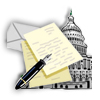 A group of engineers, networking specialists, security experts and other specialists deeply involved with the Internet’s development and growth have sent a letter to lawmakers criticizing the highly controversial SOPA and PIPA bills and imploring them not to pass the legislation, which they say would stifle innovation and “threaten engineers who build Internet systems or offer services that are not readily and automatically compliant with censorship actions by the U.S. government.”
A group of engineers, networking specialists, security experts and other specialists deeply involved with the Internet’s development and growth have sent a letter to lawmakers criticizing the highly controversial SOPA and PIPA bills and imploring them not to pass the legislation, which they say would stifle innovation and “threaten engineers who build Internet systems or offer services that are not readily and automatically compliant with censorship actions by the U.S. government.”
The letter is short and to the point, explaining that, under the provisions currently found in the Stop Online Piracy Act in the House of Representatives and the Protect IP Act in the Senate, the United States would be not only actively hampering technological innovation, but also opening up a host of other problems lawmakers likely hadn’t considered.
“If enacted, either of these bills will create an environment of tremendous fear and uncertainty for technological innovation, and seriously harm the credibility of the United States in its role as a steward of key Internet infrastructure. Regardless of recent amendments to SOPA, both bills will risk fragmenting the Internet’s global domain name system (DNS) and have other capricious technical consequences. In exchange for this, such legislation would engender censorship that will simultaneously be circumvented by deliberate infringers while hampering innocent parties’ right and ability to communicate and express themselves online,” the letter says.
The letter is signed by a long list of Internet pioneers and other respected figures, including Steve Bellovin, Paul Vixie, Vint Cerf, Jon Callas, Tony Li, Robert W. Taylor, Esther Dyson and Fred Baker, among many others. Both SOPA and PIPA have been criticized heavily by technologists, privacy advocates and security experts who say that not only would the proposed bills make it difficult for companies to create innovative new technologies, but they also would likely not even accomplish the goals their authors’ had in mind, namely preventing copyright infringement and content piracy.
Worse, the authors say, it could also create unforeseen security and other problems on the Internet.
“The current bills — SOPA explicitly and PIPA implicitly — also threaten engineers who build Internet systems or offer services that are not readily and automatically compliant with censorship actions by the U.S. government. When we designed the Internet the first time, our priorities were reliability, robustness and minimizing central points of failure or control. We are alarmed that Congress is so close to mandating censorship-compliance as a design requirement for new Internet innovations. This can only damage the security of the network, and give authoritarian governments more power over what their citizens can read and publish,” they wrote in the letter.
SOPA has gone through a number of iterations, with changes made at every step, but opponents say that some of the changes have made the bill worse, not better. A fresh round of changes made in the last few days has not done much to change that.
“The Stop Online Piracy Act (SOPA) and PROTECT IP Act (PIPA) enable online censorship on a massive scale and threaten to break the Internet, all in the name of intellectual property enforcement. These bills could encompass any foreign site accessible from the U.S. They give the U.S. government and individuals the ability to leverage Internet intermediaries to ‘blacklist’ sites accused of copyright infringement. Such actions are inconsistent with OECD principles aimed at ‘limiting intermediary liability’. Finally, the DNS blocking contemplated by these bills would undermine the usability of the DNSSEC security measures that are meant to authenticate domains and deter tampering with the DNS system. The reliability and integrity of the DNS is an important part of OECD’s aim of promoting Internet security, to which the United States is supposed to be committed,” Katitza Rodriguez of the EFF wrote in an analysis of the bill on Wednesday.









